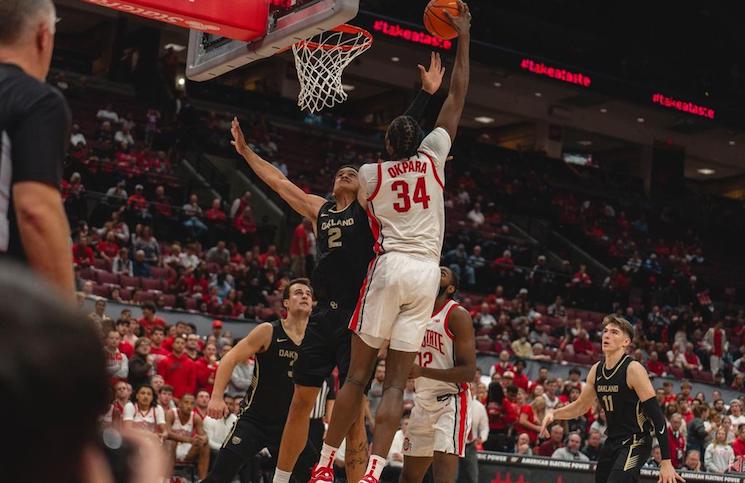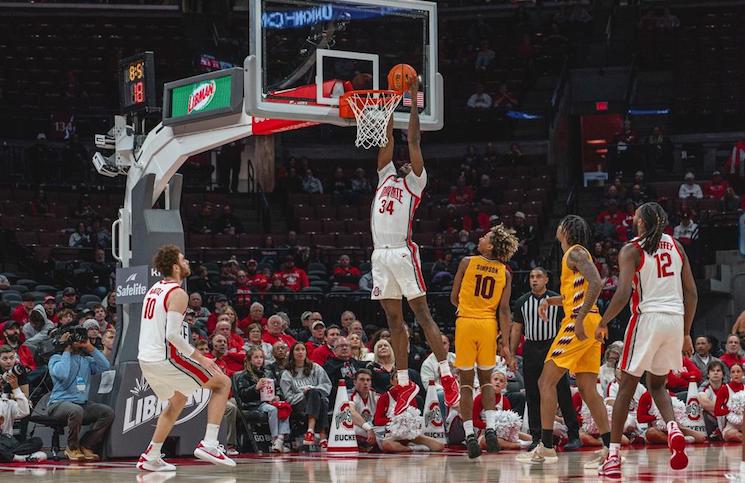
This Saturday, we will all finally get to see the rematch of last year’s dramatic contest between Tennessee and Memphis in men’s basketball.
The No. 19 Vols (7-1) host No. 13 Memphis (8-1) this Saturday, December 14th for a 3:00 PM Eastern tip-off in Thompson-Boling Arena. Last year, Tennessee traveled over to Memphis and gave the Tigers a 102-92 defeat, but it was comments by Memphis head coach Penny Hardaway after the game that made headlines.
Hardaway alleged that UT’s players had their “fists balled up” and were ready to fight his team during a brief altercation late in the second half during a timeout. Tennessee head coach Rick Barnes joked about the matter a day later, which then prompted Hardaway to tell Barnes to “get the (expletive) out of here” with his comments.
Needless to say, this Saturday’s match-up has been talked about ever since last year’s game ended. And the environment inside Thompson-Boling Arena on Saturday is sure to be wild.
But outside of the off-court drama, how do these two teams match up from an actual playing perspective? Statistically, does one team have a noticeable advantage over the other?
Here’s a look at how Memphis and Tennessee compare statistically to start this season with some more in-depth analysis after all the numbers.

Points Per Game
Tennessee: 71.3
Memphis: 82.1
Points Per Game Allowed
Tennessee: 55.9
Memphis: 64.8
FG%
Tennessee: 45.1%
Memphis: 47.1%
Opponent FG%
Tennessee: 36.5%
Memphis: 36.2%
3-Point FG%
Tennessee: 33.3%
Memphis: 34.1%
Free Throw %
Tennessee: 73.1%
Memphis: 69.0%
Rebounds Per Game
Tennessee: 39.6
Memphis: 41.3
Opponent Rebounds Per Game
Tennessee: 31.3
Memphis: 36.6
Assists Per Game
Tennessee: 15.8
Memphis: 15.4
Turnovers Per Game
Tennessee: 13.9
Memphis: 15
Blocks Per Game
Tennessee: 6
Memphis: 6.8
Adjusted Offensive Efficiency (KenPom)
Tennessee: 108.7 (33rd)
Memphis: 107.5 (44th)
Adjusted Defensive Efficiency (KenPom)
Tennessee: 89.5 (14th)
Memphis: 91.4 (41st)
Tempo (KenPom)
Tennessee: 66.1 (303rd)
Memphis: 76.1 (10th)
Strength of Schedule (KenPom)
Tennessee: 255th
Memphis: 213th
KenPom Ranking
Tennessee: 21st
Memphis: 34th
Top 3 Scorers
Tennessee: Jordan Bowden (13.9 PPG), Lamonte Turner (13.8 PPG), Yves Pons (12.6 PPG)
Memphis*: Precious Achiuwa (13.9 PPG), DJ Jeffries (12.0 PPG), Boogie Ellis (9.7 PPG)
*neither James Wiseman (19.7 PPG) nor Lester Quinones (10.3 PPG)are included since neither will be playing on Saturday
Firstly, it’s worth noting that two of the Tigers’ best players won’t be participating on Saturday. Superstar center James Wiseman is ineligible to play in any games for Memphis until January, and Lester Quinones is dealing with an injury that has sidelined him the last few games and will keep him out of Saturday’s contest.
Without both of those players on the court, the Tigers have seen their scoring drop from 86.7 points per game in their first six games to 73 points a game over their last three contests.
Overall, however, Tennessee and Memphis share a lot of similarities on paper.
Both teams feature stout defenses. Overall, the Vols have a better defense, but the Tigers are certainly no slouch on the defensive end, as both teams come in inside the top 50 of KenPom’s adjusted defensive efficiency ratings. Memphis averages slightly more blocks per game than UT, but the Vols are holding teams to much fewer points — thanks, in part, to a slower tempo, but more on that in a moment.
Offensively, Memphis would appear to have the edge initially, but the Vols actually have a slightly better adjusted offensive efficiency rating, and UT has a better average rebound margin per game. Both teams are essentially even in assists per game and three-point shooting — though Tennessee is attempting threes at a slightly higher rate than the Tigers (32.9% of UT’s field goal attempts are threes compared to 30% for Memphis).
Easily the biggest difference between Tennessee and Memphis is the pace at which they play.
The Tigers love to get out and run. Memphis is playing at the 10th-fastest tempo in college basketball this season according to KenPom’s adjusted tempo rankings. Memphis is averaging just over 76 possessions per game, and they’re attempting 60.7 field goals a game. Counting free throw attempts, Memphis is averaging nearly 90 opportunities to score per game.
Tennessee, on the other hand, is playing a lot more like Virginia basketball typically does.
The Vols have one of the slowest paces in college basketball so far this season. Out of 353 Division I teams, their adjusted tempo on KenPom ranks 303rd (Virginia is 353rd, unsurprisingly). Tennessee is averaging 10 fewer possessions per game than Memphis (66.1), and the Vols are only attempting 54.6 field goal attempts a game. When you add in UT’s free throw attempts, Tennessee is averaging about 76.5 opportunities to score a game.
Saturday’s game will likely be a defensive-oriented contest, but the big question will be which style wins out. Will the Vols’ slower pace bog down the Tigers, or will Memphis get Tennessee uncomfortable and force some erratic, rushed play?
Tip-off for Saturday’s much-anticipated contest is at 3:00 PM Eastern.



